Digital Transformation – Imperative or a New Buzzword?

Why is it important for organizations to embrace digital transformation? Just ask anyone that once worked for Blockbuster. It’s not that we quit watching movies, but how we watch them changed dramatically, and it’s companies like Netflix that redefined the movie industry and are now on top. Obviously, no company wants to be the next Blockbuster, but launching a digital transformation initiative can be daunting and complex. So, I sat down with OneNeck’s CTO, Clint Harder, to get his thoughts on what digital transformation entails, and where should you start…
While I’ll be the first to admit that digital transformation is an over-used buzzword probably invented by some marketing person like myself, there is no arguing that it is driving real change in today’s organizations. But, it can mean different things to different people. So, how do you define digital transformation?

Do you see this as a new trend, or is it something that’s been going on for a long time and we’ve just now given it a name?
We’re in a new phase of something that’s been going on for a long time which is enabled by the internet, cloud, all the new technologies. In the past we were addressing manual, paper-based processes with traditional technology, like client/server, application architecture, LAN, VPN, etc., and only your users internal to the company were using it.
Now with more digital tools – all the buzzwords you hear about – cloud, AI/machine learning, big data, internet of things, all those are creating more digital tools and data that you can build new business processes on, that often times directly involve the customers in that process because they have an app on their phone or they can go to a browser or the Internet. So, it gets the customers much more active in your business processes the more those processes are digitized.
I attended a conference a couple weeks ago, and one of the speakers stated that digital transformation is not a technology problem, but a business imperative. What are your thoughts on this statement?
I agree, though digital transformation to me is a natural evolution, where the faster you do it, potentially the better the benefits. But being first has its own risks. I don’t look at it as a technology problem or really a technology question per se at all. There are digital technologies that can help you create new business processes and new business lines. So, I’d generally agree with this statement, though I think imperative is a strong word. So, I’d be more inclined to use a term like evolution or next step in the natural progression today’s business must follow.
According to a recent 451 Research survey, nearly 80% of organizations reported that their IT environments required moderate or significant levels of transformation to meet digital business requirements in coming years. That’s a sizable number that indicates the majority of organizations have a lot of work to do. Where would you recommend they start in their journey?
You need several things to start with. Depending on your level of maturity and where you are in the process, you need an appropriately-detailed strategy – what you’re trying to accomplish, potential low-hanging fruit, as well as potential highly-transformative initiatives. It’s incredibly important to be very clear on your WHY. Why are we doing this, and why is it important? Then tie that into the strategy.
I think early on you need to develop and document standards. There are so many choices, toolsets and potential interactions, APIs and micro-services, all of which need to get tied together. If you do best in breed for all of your individual digital transformation initiatives, you’re going to end up with a disjointed labyrinthine collection of digital transformation tools, which in the end, will work against your digital transformation.
And the third thing, very early, you should pick one or two, appropriately scoped proof of concepts to start to get some real-world experience with the effort. One could be taking an existing, fairly simple business process or activity and digitizing it. And if possible, another (again properly scoped) new initiative, a new business process, something new that you would look for digital technology to enable.
How do you know you’re on the right path and not simply going down the path to digital optimization?
It’s somewhat semantics in my opinion. My advice here, don’t get hung up in the jargon. Just make sure that whatever you’re doing is clearly scoped with clearly defined and expected results, and a clear way to measure success.
Does an organization ever get to a place in their digital transformation where they can mark it complete?
What I think happens eventually is this goes away as a concept and becomes a core part of our business. We’re going to be running mostly, if not completely, digitally-enabled businesses, where there really won’t be anything to transform. It’d be like, are we still talking about the PC transformation? No. At a certain point, it becomes core to business competency, and at that point it falls away as a separate concept, or a separate discipline or practice that some are doing and some aren’t. All the survivors will be doing it. It’ll be the price of entry – the table stakes to be in business in the next several years…
LEARN MORE: Rethinking IT Security in an Age of Digital Disruption
Additional Resources:





